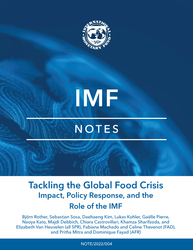
Tackling the Global Food Crisis: Impact, Policy Response, and the Role of the IMF
Food insecurity has become a major global challenge. Urgent, coordinated action on a global scale is required to support vulnerable households, maintain open trade, enhance food supply, and invest in climate-resilient agriculture. The IMF has stepped up its action in this area.
READ MORE...
Volume/Issue:
Volume 2022
Issue 004
Publication date: September 2022
ISBN: 9798400221972
$5.00
Add to Cart by clicking price of the language and format you'd like to purchase
Available Languages and Formats
| English |
Prices in red indicate formats that are not yet available but are forthcoming.
Topics covered in this book
This title contains information about the following subjects.
Click on a subject if you would like to see other titles with the same subjects.
Economics- Macroeconomics , Economics / General , Food insecurity , Russia’s war in Ukraine , global inflation , terms of trade shock , international cooperation , open trade , vulnerable households , agricultural production , IMF lending , IMF policy advice , capacity development
Summary
Russia’s war in Ukraine has exacerbated food insecurity that had already been on the rise for half a decade. Low-income countries are affected the most. This note suggests that the food and fertilizer price shock would add $9 billion in 2022 and 2023 to the import bills of the 48 most affected countries. The budgetary cost of protecting vulnerable households in these countries amounts to $5–7 billion. Strong and timely action on a global scale is needed to support vulnerable households through international humanitarian assistance and domestic fiscal measures; to maintain open trade; to enhance food production and distribution; and to invest in climate-resilient agriculture. The IMF has been stepping up its engagement to help tackle the global food crisis, working closely with partners, by providing policy advice, capacity building and financing. IMF financing is a third line of defense in meeting external financing needs associated with the global food shock, which should ideally be covered by donor grants and concessional borrowing from MDBs. A new food shock window under the emergency financing instruments is expected to be approved soon to further strengthen its lending response to the food crisis.
Copyright © 2010 - 2026
Powered by:
AIDC



